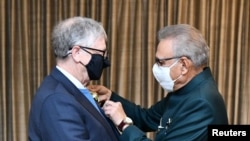Microsoft co-founder turned philanthropist Bill Gates met with Pakistani Prime Minister Imran Khan on Thursday in Pakistan to acknowledge the country’s progress against polio.
During the trip, his first to Pakistan, Gates also stressed the need to curb virus transmissions in neighboring Afghanistan and preserve global gains.
Pakistan and Afghanistan are the only two countries where wild polio virus continues to paralyze children, although not a single infection has been reported in Pakistan for more than a year.
Gates told reporters in Islamabad at the end of his visit that the South Asian nation, where the disease crippled approximately 20,000 Pakistani children a year in the early 1990s, has an opportunity to eliminate polio.
"We're not done, but we're certainly in by far the best situation we have ever been in. We've never had a year without zero cases," he said.
But Gates cautioned that the polio virus was detected as recently as December in sewage samples in Khyber Pakhtunkhwa province, which borders Afghanistan, stressing the need for Pakistan to keep up the momentum and stay vigilant.
"I think that the steps taken in Pakistan during 2022 will probably set us up to finish polio eradication," Gates said while speaking alongside Faisal Sultan, the special assistant to Khan on health affairs.
Gates co-chairs the Bill & Melinda Gates Foundation, which is part of the Global Polio Eradication Initiative project between governments and international organizations.
In a televised ceremony, Pakistani President Arif Alvi conferred the Hilal-e-Pakistan, the country's second-highest civilian award, on Gates for his work to fight poverty and diseases, including polio.
Gates and Sultan said polio transmissions in Afghanistan continue to pose a challenge to Pakistan's eradication program and global gains against the disease. Gates noted, however, that Afghan vaccination rates have gone up in recent months after dropping off for more than three years.
"There is more vaccination taking place in Afghanistan now than for the last three years. … But it's still not as high as it should be, and so there's work to be done in terms of understanding how we support them," Gates said when asked for his comments on the eradication efforts since the Taliban takeover of the country in August.
The United Nations says that in November and December 2021, health workers were able to deliver polio vaccinations to 2.6 million Afghan children who had been inaccessible since 2018 because of the conflict.
Sultan said Pakistan was closely working with Taliban authorities to stem polio transmissions through a joint effort on both sides of their common border.
Afghan authorities reported four cases of wild polio in 2021, down from 56 cases a year before.
"We have directly engaged with them and have ongoing conversations to make sure that a synchronized campaign for eradication of polio can continue because we look at our two countries adjacent to each other as, epidemiologically speaking, tightly linked to the eradication of polio," Sultan explained.
The GPEI reported Thursday that Malawi has detected a case of type 1 wild poliovirus or (WPV1) in a 3-year-old child suffering from paralysis in Lilongwe.
“Analysis shows that the virus is genetically linked to WPV1 that was detected in Pakistan’s Sindh province in October 2019,” the statement said.
It noted that the detection of WPV1 outside the world’s two remaining endemic countries, Pakistan and Afghanistan, is a serious concern and underscores the importance of prioritizing polio immunization activities.
As an imported case from Pakistan, this detection does not affect the WHO African Region’s wild poliovirus-free certification status officially marked in August 2020, according to the GPEI.





